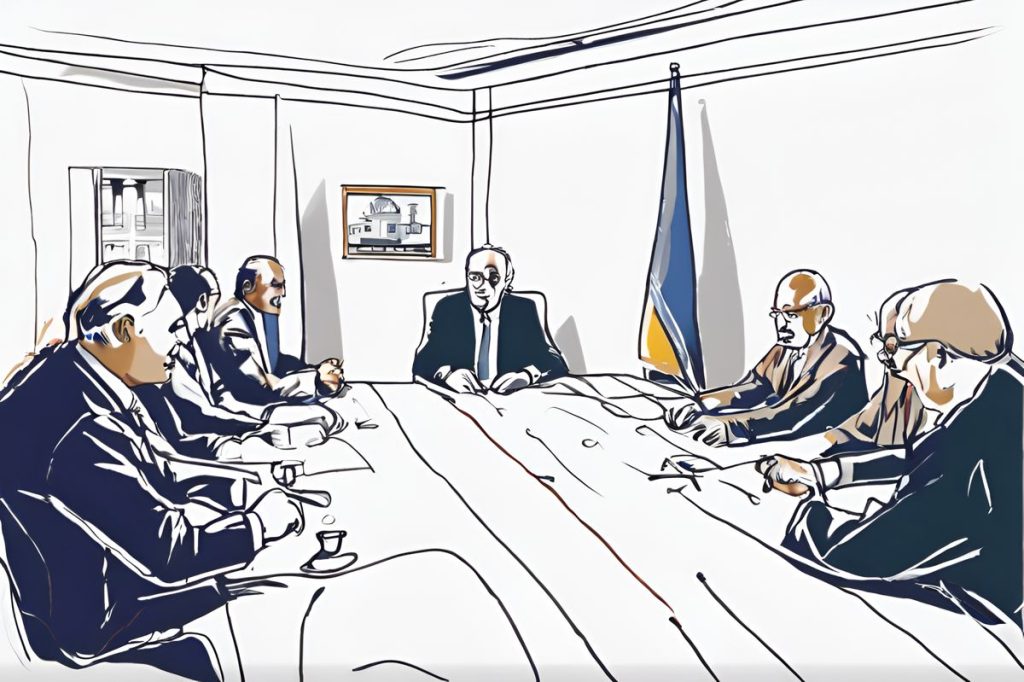The EU plays a crucial role in the Cyprus peace negotiations, using its leverage to foster stability and reconciliation. Diplomatic efforts by the EU, alongside the UN envoy and local leaders, aim to achieve a lasting resolution to the Cyprus issue, showcasing the EU’s capacity to mediate complex geopolitical challenges.
What is the role of the EU in the Cyprus peace negotiations?
The European Union (EU) acts as a transformative force in Cyprus peace negotiations, aiming to utilize its leverage to foster stability and reconciliation. The EU’s strategic involvement is seen as pivotal, with diplomatic efforts focused on engaging with the UN envoy and local leaders to achieve a lasting resolution to the Cyprus issue.
Diplomatic Efforts and EU Involvement
The European Union’s potential to influence peace talks in Cyprus has recently come under the spotlight. Government spokesperson Konstantinos Letymbiotis emphasized the EU’s capacity to act as a transformative force in the negotiation process. He highlighted the ongoing diplomatic push for deeper EU engagement in resolving the long-standing Cyprus issue.
During a media briefing, Letymbiotis responded to queries about the EU’s engagement by reinforcing the belief that its active participation could be pivotal. The recent appointment of a UN Secretary-General’s envoy was met with approval, signaling a readiness among both local and European actors to pursue a more dynamic EU role in the dialogue. The envoy’s initial visit to Cyprus set the stage for subsequent discussions, marking a strategic move in what is widely acknowledged as a complex challenge.
Communication and Prospective Visits
Dialogue between the UN envoy and local leaders is crucial. Regular exchanges between President Nikos Christodoulides and the envoy underscore the commitment to maintaining momentum. Letymbiotis reminded journalists of an upcoming visit scheduled for the second half of March. During this time, the envoy plans to meet not only with political figures, including President Ersin Tatar, but also with various organized groups in Cyprus.
Despite skepticism regarding the EU’s interest or progress, reassurances were made that the envoy’s first visit was a natural precursor to more substantive discussions. The Cypriot government remains steadfast in its pursuit of a solution, viewing the EU’s role as beneficial to the peace process. Continued diplomatic efforts aim to ensure that the EU’s leverage is fully utilized in the forthcoming negotiations.
The UN’s Commitment and Broader Implications
The United Nations’ involvement, as evidenced by the Secretary-General’s personal envoy, signifies international investment in the resolution of the Cyprus problem. The broader implications of the EU’s potential catalytic role in Cyprus could extend beyond the island itself, contributing to stability in the region and demonstrating the EU’s capacity to mediate complex geopolitical issues.
The EU’s strategic interest in Cyprus is not only a matter of regional security but also touches on the values and principles the Union stands for, including peace, reconciliation, and cooperation among member states. An active and constructive EU role in Cyprus could serve as a testament to these values and strengthen the EU’s foreign policy credibility.
Looking Ahead: The Path to Reconciliation
As we look toward the future, the continued diplomatic efforts by Cyprus to involve the EU more actively in the negotiation process are indicative of a potential shift in how regional conflicts are approached and managed. While the path to peace and reconciliation in Cyprus remains fraught with challenges, the proactive stance of Cypriot leaders and the international community offers a beacon of hope.
The forthcoming period will be telling, as the UN envoy’s interactions with key stakeholders may shape the trajectory of future negotiations. The EU’s readiness to take on a more assertive role could redefine the landscape of diplomacy in one of the longest-standing disputes within its borders. The hope is that through sustained effort and international cooperation, a lasting resolution to the Cyprus issue will be achieved.
What is the role of the EU in the Cyprus peace negotiations?
The European Union (EU) acts as a transformative force in Cyprus peace negotiations, utilizing its leverage to foster stability and reconciliation. The EU’s strategic involvement is pivotal, with diplomatic efforts focused on engaging with the UN envoy and local leaders to achieve a lasting resolution to the Cyprus issue.
How is the EU involved in the diplomatic efforts regarding Cyprus?
The EU’s potential to influence peace talks in Cyprus has recently been highlighted, with government officials emphasizing the EU’s capacity to act as a transformative force in the negotiation process. Dialogue between the UN envoy and local leaders is crucial, with the EU engaging in regular exchanges to maintain momentum and push for deeper involvement.
What are the broader implications of the EU’s role in the Cyprus negotiations?
The EU’s potential catalytic role in Cyprus extends beyond the island itself, contributing to stability in the region and showcasing the EU’s capacity to mediate complex geopolitical challenges. The EU’s strategic interest in Cyprus aligns with its values of peace, reconciliation, and cooperation among member states, strengthening its foreign policy credibility.
What can we expect looking ahead in the Cyprus peace negotiations?
As diplomatic efforts continue, the EU’s readiness to take on a more assertive role may redefine the landscape of diplomacy in one of the longest-standing disputes within its borders. The hope is that through sustained effort and international cooperation, a lasting resolution to the Cyprus issue will be achieved, offering a beacon of hope for peace and reconciliation in the region.

